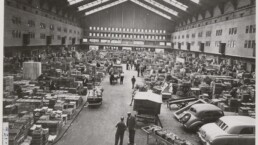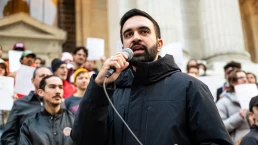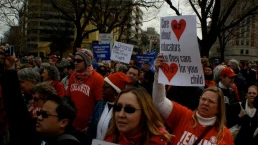A ceremony at an old food market in Amsterdam prompts reflections on tragedy, indifference and survival
By Ariel Dorfman, New Lines
On May 4, as war and famine raged in Gaza, Amsterdam marked Remembrance Day, an annual commemoration of those who resisted the Nazi occupation, with special emphasis from the city’s organizing committee on the Jews who perished in the onslaught. Among the dozens of ceremonies that crisscrossed the city, I joined one at the Centrale Markthal, a building that had, throughout that period of dread, housed a vast open-air market that sold food to Amsterdammers, though it is currently dedicated to spectacles, parties and gatherings enjoyed by those who, mostly, know little about that remote tragedy.

I was there at the invitation of Max Arian, an 84-year-old Dutch friend, one of the speakers that day. I had met him 50 years ago, on my first visit to the Netherlands to drum up solidarity for the Chilean resistance to the dictatorship of General Pinochet, which drove me into exile. Max, as a secular Jewish survivor of the Nazi occupation, was particularly attuned to freedom and national liberation struggles elsewhere around the world, including the struggle of the Palestinian people for a homeland and an end to the occupation. What bonded us most back then, of course, was how he identified with the promise of Salvador Allende’s peaceful revolution, which was abruptly ended by Pinochet’s 1973 coup d’etat.
During that initial, hospitable encounter, he hinted at his childhood story, but I only learned the details when, with my wife and son, I moved to Amsterdam in 1976 for a four-year stay — welcomed warmly by Max and his family, like an echo of the refuge he had been given as a young boy back in 1943.
Recent Posts
Politicians Are Betraying Gen Z On Climate
July 10, 2025
Take Action Now While Gen-Zers thrift, knit, crochet, and find other ways to reduce our footprints, Trump and the GOP are greenlighting more climate…
Trump’s Deportation Threat Against Zohran Mamdani Is Shameful
July 10, 2025
Take Action Now In only half a year of Donald Trump’s presidency, he and his allies have turned deportation into an explicitly political threat…
Teachers Union Votes To Cut Ties To The Anti-Defamation League
July 10, 2025
Take Action Now In a momentous vote, the National Education Association voted to cut all ties with the Anti-Defamation League. The reason? “Despite…
2025 War Abolisher Awards Go To Albanese, Nader, Waters
July 9, 2025
Take Action Now The purpose of the awards is to honor and encourage support for those working to abolish the institution of war itself.By World…




